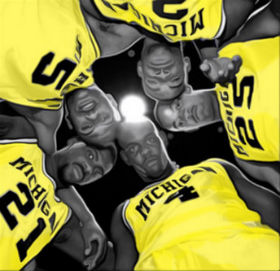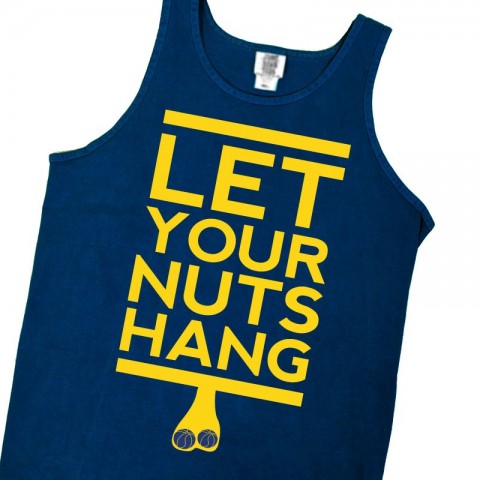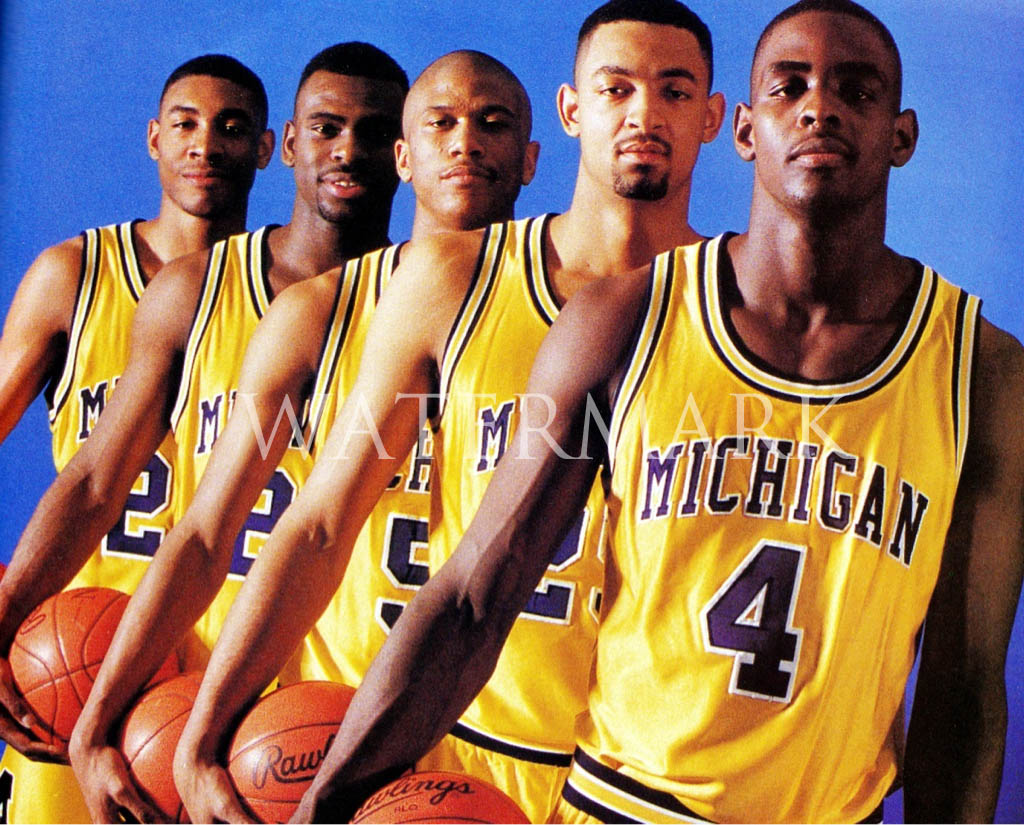
Welcome to the Weekend BAE-BAE!
The Final Four is upon us. One of the biggest days in sports in this country. One of the reasons for the popularity is the talent that has emerged over the years. As a child of the 80s, it is my perogative to believe that era produced some of the legendary teams on the court for college basketball by way of The Runnin Rebels, Hoya Paranoia, Phi Slamma Jamma and who can forget the 1982 Tar Heels – James Doherty, James Worthy, Sam Perkins, Jimmy Black and a freshman Michael Jordan? But in terms of most pop culture influence, well that title has to go to the 90s Michigan Fab Five.
Baggy shorts, black shoes, and black socks – The five starting freshmen for Michigan’s basketball team transformed basketball fashion and sparked a revolution within college sports. Their unapologetic ode to Hip Hop sent the conservative sports media filled with middle aged white men into a frenzy. Not only did the Fab Five dress the part, even shaving their heads…but the playground ball and trash talk that was usually reserved for inner city courts and “I got next” bravado, made its way to primetime on CBS. America wasn’t ready…..but AMERICA GOT READY.
It was the University of Michigan Wolverines basketball team who really bought hip-hop and ‘ball together like no other. Lead by two Detroiters, Chris Webber and Jalen Rose, the “Fab Five” enacted the takeover of college ball in 1991 when their coach Steve Fisher decided to start five freshmen. The five teenagers, with their shaved heads, extremely baggy shorts, black socks and overall swagger, were straight out of a hip-hop video. Because of the influence of the Fab Five, Michigan basketball jerseys and athletic gear in general started becoming quite common as the attire of a newly emergent hip-hop generation.
When the Fab Five broke their huddles following a timeout, instead of simultaneously saying “Defense!” as is customary, they ended saying, “Let your nuts hangs,” quoting a lyric by Geto Boys rapper Scarface. While many might assume that “Fab Five” referred to the Beatles (“Fab Four”), in this case it echoed Fab Five Freddy, a hip-hop pioneer and host of the influential “Yo, MTV Raps!” music video show.
In their words – Ray Jackson, Jimmy King and Jalen Rose relive those years and talk about life as The Fab Five:
Why was the Fab Five so misunderstood at the time? Was it simply a generational gap or a racial gap? Or was there more to it?
Jackson: A little bit of both, but it was basically the newness. With it being a new experience for everybody, a lot of people didn’t know how to embrace it or handle it. It was a little bit of race, a little bit of newness. We were just ahead of our time.
Rose: People do view you based on your appearance and judge you based on that. If we’re five black guys at the University of Michigan, and it’s like, “You have the nerve to jump up in Christian Laettner’s face and talk trash? He’s God to us. You have black shoes, black socks, bald heads, long shorts?” Like, that’s too much at one time. … It wasn’t just the media; there were people who really had a sincere hatred because not only did they not like us, but they didn’t want their kids to be like us.
Many of those things you were sharply criticized for — trash talk, baggy shorts, black socks and shaved heads — are commonplace in basketball today. Do you feel vindicated?
Jackson: You turn on TV now and Duke might have on black socks and black shoes. You would have never thought in ’92 or ’93 that you’d ever see it.
King: It’s commonplace to see guys show their emotions on the court now when they play. When they get a game-changing dunk, it’s all right to run down the court screaming, yelling, pounding your chest and talking to the crowd. That’s normal, and it’s exciting. But back when we were doing it, we were villainized. … That’s how people outside of the structure of college basketball played. So we brought that to the mainstream, and I don’t think people were ready to make that change.
Rose: We were rough. We were raw. We were unpolished. We weren’t clean cut. We didn’t conform to a lot of the stereotypical things that were called upon for young black athletes at the time. If you had an earring or a tattoo, you were considered a thug back then. That was considered like a huge stand in society.
Jackson: A lot of people don’t understand the basketball IQ we had at that age. Our IQ was through the roof. I look back at films now, and we bought into the system that Fish had. It might not have been a style that particularly fit for us, but because we understood the game we bought into the system and made it a success for all of us.
What was the biggest reason each of you choose to attend Michigan?
King: For me, it was the best of both worlds. It was the academics, and it was the athletics. … We weren’t typical players. Academics mattered to us. We went to school. Jalen was on the Dean’s List. Ray is one of the smartest people I know, even though he downplays it. But the guy who’s usually downplaying it is usually the smartest. Chris was highly intelligent. Juwan was a great student. Everybody took the academics seriously, which is overlooked.
Jackson: We all had a helluva support [system] with our parents. … Our structure was there. It was in place. The foundation was there, so I think that had a lot to do with it. Michigan, like Jimmy said, gave us the best of both worlds. We had Desmond Howard on the football field. We had the best hockey team in the country. And we considered Michigan academically as the Harvard of the Midwest. You couldn’t beat it, and then we also saw the opportunity to come in and play as freshmen.
When you were choosing a school, Jalen, how important a factor was your high school coach, Perry Watson, who was rumored to be joining the Michigan staff the following season?
Rose: It was very important because Perry was like a father figure to me since middle school. It’s not like he was some run-of-the-mill AAU coach that all of the sudden got the job at Michigan because I signed a letter of intent. He had players attend the University of Michigan — Antoine Joubert, Leslie Rockymore — 10 years before me. Being the most accomplished high school coach in the city of Detroit, it was a good opportunity for him to take his accomplishments to the next level. It just so happened it was my senior year … and he had a great relationship with Chris, who was the No. 1 player in the country. So, really it made sense.
King: Also, [Watson’s] résumé speaks for itself, and behind the scenes he had a lot to do with our development mentally. It’s the big leagues going from high school to college. It’s a different speed. It’s a different ballgame. You know, it’s a step closer to professionalism, and you have to develop and grow. He was a very integral part of that for all of us.
Jackson: Being that strong black man that we could relate to meant a lot. A lot of games when I would get frustrated, he would sit there and write a letter to me on a napkin while we were watching film, just to keep me motivated and keep me focused.
The documentary reveals that the Michigan basketball office received a lot of hate mail complaining about the Fab Five, some of it dripping with racist language. Were you aware of any of that at the time?
Rose: Of course we were. You know how people say “bulletin board material”? We used it for real. We put it up on a bulletin board [in the locker room].
Jackson: For motivation.
Rose: We left it up there. Don’t take it down. We walked past it whether it was a practice or you were going in there to shower or whatever. It was there. It became a part of who we were.
Jackson: It brought us a lot closer together.



